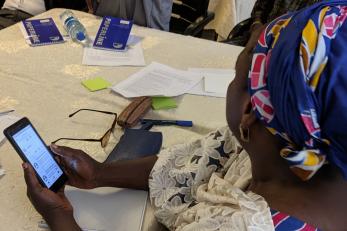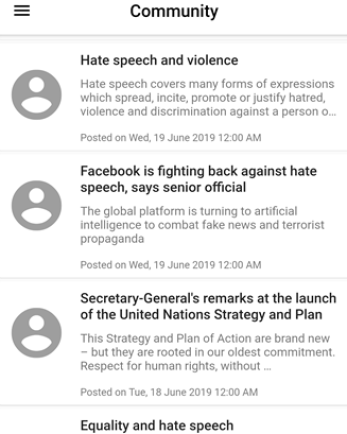Lessons learned from hacking hate speech

In 2018, Mercy Corps Nigeria and the Technology for Development (T4D) team collaborated in a bid to use technology and community cohesion to address the spate of hate speech online at Mercy Corps Nigeria’s Hate Speech Hackathon, where stakeholders from diverse sectors came together to brainstorm solutions to it.
Mercy Corps team member Faye Mooney led the event that ultimately produced the winning concept, YAFE, a mobile app designed to help communities discuss and steer away from spreading online and offline hate speech. YAFE, meaning forgiveness in Hausa, was named for Faye, who tragically passed away shortly after the event. The app was designed and piloted over one year with some religious and community leaders in North Central, Nigeria who were participants of a Mercy Corps’ Conflict Mitigation Management program.

During the course of designing the YAFE pilot, which was also meant to test new ways for Mercy Corps staff to engage remotely with people they could not reach due to security concerns or remote locations without the use of technology, many key lessons emerged around the use of technology in community cohesion and countering dangerous speech. Some key takeaways Mercy Corps learned during the design phase were: setting clear expectations with all parties involved, establishing streamlined work plans and understanding technical limitations early in order to adapt to changes as they come.
A number of key lessons were also gained while implementing the YAFE pilot, which includes planning and designing content with participants as it evolves, building a safe community through a curated and moderated group which creates a sense of trust for sharing information in a positive way.In summary, the YAFE pilot discovered the power of building a community on a digital platform as a means for community mediation activities. The users were able to foster trust and develop meaningful relationships in a private and closed group that was tactfully moderated by Mercy Corps staff, to ensure dangerous narratives and rumors were dispelled and to encourage discourse about community cohesion on the platform.
As a result of the ability for the YAFE digital community to bring together users across geographically remote and insecure locations, and then collate information on potentially dangerous narratives or rumors and address events occurring in the communities triggered by dangerous speech. There is a potential for an approach like this to inform an early warning system, allowing for identification and tracking of indicators that may indicate an escalation in violence or group tensions.
The Mercy Corps Technology for Development and Nigeria teams are currently working together to further hone our utilization of digital communities and ICT tools to combat the spread of misinformation and to support the creation of digital communities that support cohesion between groups.